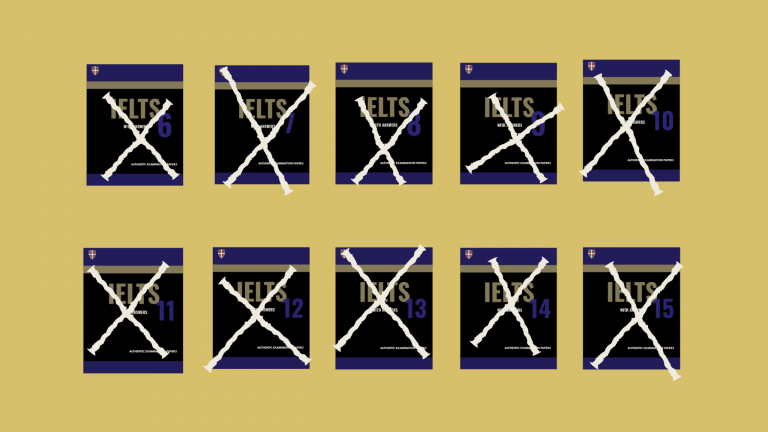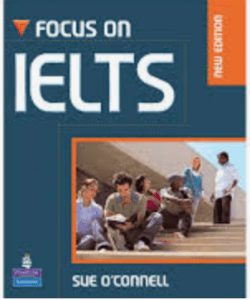
The WORST way to prepare for IELTS reading and listening!
How do you prepare for IELTS reading and listening? I think that for 99% of students, the answer is just “practice, practice, practice”. But almost every week, I get an email or a message on Facebook from a student that looks like this:
Hey Shelly,
I have finished Cambridge books 5 – 14. Can you recommend another source for reading and listening practice?
Messages like this make me really sad because there is no reason at all for any student to ever run out of Cambridge practice tests!
In fact, if your way to prepare for IELTS reading and listening is simply doing practice test after practice test, you are preparing in the least effective way possible. Why? Let me explain!
The purpose of the IELTS Cambridge Books
Cambridge prints the IELTS books for two reasons:
- to give students the chance to see what their current test score is.
- to give students the chance to see the “level” of the real exam and the format of the questions
If you have studied at university, it is common practice for university lecturers to show you the exam questions from previous exams. I remember spending hours looking at these when I was a student to check that I could answer the previous questions. However, was this how I PREPARED for those tests? No! The preparation came in the lectures and tutor groups that I attended. If I had just looked at the exam questions, I would have found it almost impossible to pass!

In the same way, if you are studying IELTS in a school or a good preparation centre, you should complete only a small number of tests from the Cambridge books in class. Instead, your teacher should be preparing you with a good course book like Objective IELTS, Ready for IELTS, or IELTS Masterclass, which introduces each of the skills tested in the exam alongside useful vocabulary and grammar structures.
In fact, on the last IELTS course that I taught at my university (which was 88 hours long), guess how many full Cambridge IELTS tests I used in that time?
THREE!
Yes, you read that correctly – THREE. One near the start of a course so that students can understand the overall test format, one in the middle to check progress, and one at the end to focus on test technique.
So, what was I doing in class for the other 75 hours of the course?
I was teaching my students the skills they need to do well in those tests.
Yes, we did reading and listening, but in those lessons we were focusing on how to approach each type of question, improving our language, and breaking down difficult questions to understand how they work.
You see, the Cambridge books are there to TEST your current level – they are not designed to be used as a teaching tool.
How to use the IELTS Cambridge Books if you are self-studying
I understand that not everybody who takes IELTS wants to study in a classroom with a teacher, but you should be using the same principles when you use the Cambridge books at home. Definitely use the books at the start of your preparation to understand the format of the test and your current score, but once you have taken two or three tests to do this, STOP.

There is no point taking any more as you will simply get the same score again and again! Why? Because doing the endless tests will NOT improve your level – well, it might a little bit, but it is the least effective way to do so!
Instead, go away and do something to improve your skills. This might be improving your language by studying lexis or grammar, or focusing on one type of question to understand what it tests and why you are finding it difficult.
Which brings me to my second point – if you are self-studying, you have to become very good at analysing your own performance to understand where to focus your study next. The biggest problem that I see is that most students just complete a test, look at their scores, sigh and then move on to the next one!
If you don’t spend at least two or three hours (yes, two or three hours) analysing your performance in each Cambridge test, you are LEARNING NOTHING!!!
What exactly does this mean? What should you do when you complete an IELTS reading or listening test to help you improve your performance next time? Well, here are 4 ideas to help you:
How to analyse your performance in an IELTS Cambridge Test
1. Review the questions you got wrong. Ideally, you should keep a record of which type of questions you answered incorrectly and why. The “why” is the most important part here:
- Were you lacking lexis to understand the text?
- Did you find it hard to differentiate between false and not given?
- Were you looking in the wrong part of the text for the answer?
- Did you find the pronunciation of the speaker difficult to understand (which accent was it?)
- Did the multiple-choice options confuse you?
Once you locate the underlying problem, you can then go and find some lessons that will help you learn a better technique (i.e. like those here on my blog). Every type of question requires a unique approach, so find out what that is and PRACTICE!

2. Review the reading and listening tape-script to see if there are any words or phrases that you do not understand. Check their meaning in a dictionary and then write these words down in your vocabulary book with an example sentence. Go back and look at this book every day until you have learned the new expressions. If you can’t understand the words in the text, it is extremely unlikely that you will be able to improve your score, even with great exam technique!
3. Also, have a look at the questions and the synonyms and phrases that were used in the test to start to recognise synonyms. You will see that IELTS uses the same paraphrases again and again (i.e. weekend = Saturday and Sunday / children = young people)and actively looking for these phrases will help you to recognise them quickly in future tests.
4. Return to the test later to read the texts or listen to the tape-script again. I don’t think any students do this. I think that you should read and listen to every part of the test at least three times. Hopefully, every time you will find it easier as you become more familiar with the vocabulary and the sentence structures.

What new pieces of information do you notice now that you are more familiar with the texts? Why did you miss that the first time? If you are still struggling with listening, listen and read the typescript at the same time. This is a great way to start matching up your recognition of words by sight and by sound. Again, try to play detective and work out exactly what you found difficult the first time!
If you analyse your performances in this way, there is no way you will ever run out of Cambridge books! In fact, if you prepare for IELTS reading and listening properly, you should need no more than 3 or 4 Cambridge books (and if you do need more, then at least you will still have them to practice with!
Plus, remember that you don’t always have to listen and read IELTS books to practice those skills! Podcasts are one of the best ways to improve your general listening skills as is reading a good newspaper or journal. The more your practice these skills IN GENERAL, the stronger your skills will become.
And, if you have already finished all of the Cambridge books, don’t worry! Go back and review them now – it is never too late to analyse your errors, and that is far more useful than just doing more and more tests!
Need help analysing IELTS reading and listening questions?
If you would like a clear example of what this process looks like, then why not listen to episode 9 of my podcast, where myself and Nick break down Listening Part 3 to show you the tricks that IELTS test writers use to make you choose the wrong answers! Once you can recognise these tricks, you will find that the answers become easier to find! This is what you should be doing between tests to improve your level and your chances of getting a higher score.
I hope that you found this blog post useful. There are many ways that you can prepare for IELTS reading and listening, but I strongly recommend that completing 14 practice books is not one of them!
We are now offering free live reading and listening lessons each week to all subscribers to our writing courses (AT NO ADDITIONAL COST). So if you find that self-study is holding you back, then why not come and let an expert lead you by joining one of our IELTS packages.
